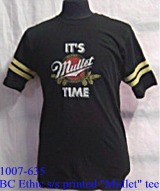 Shawn Wood is a commercial litigator and partner with the national law firm Seyfarth Shaw LLP. Shawn is also a monthly columnist for Chicago Lawyer magazine and a recipient of its Annual Writing Award. Most recently, he was honored by the Chicago Daily Law Bulletin as one of its "40 under 40 Attorneys To Watch" in 2005.
Shawn Wood is a commercial litigator and partner with the national law firm Seyfarth Shaw LLP. Shawn is also a monthly columnist for Chicago Lawyer magazine and a recipient of its Annual Writing Award. Most recently, he was honored by the Chicago Daily Law Bulletin as one of its "40 under 40 Attorneys To Watch" in 2005.The following piece is his column from the September issue of "Chicago Lawyer." He's graciously allowing me to reprint it here. Since this article first appeared, the particular case he's writing about has been dropped. It's still entertaining, however...

MULLET CASE TESTS BOUNDS OF LEGAL PARODY
By Shawn Wood
Some call it transcendentally dreadful. Others describe it as “all business in the front, all party in the back.”
Call it want you want, but the infamous Mullet haircut is making headlines again based on litigation filed in the Northern District of Illinois by Miller Brewing Company against Los Angeles-based Brandlab, Inc and retailers Nordstrom and The Buckle.
For the unenlightened (or at least for those who have never driven through Northern Indiana), the Mullet is a uniquely hideous hairstyle cut short in the front and long in the back. It was sort-of in vogue about 20 years ago, especially among the members of Styx and Journey.
Perhaps seizing on the ironic celebration of the notorious haircut on various websites (such as mulletsgalore.com, which details the subtle but important distinction between the euromullet and feathermullet), Brandlab distributed t-shirts reading “It’s Mullet Time” and “Mullet Low Life,” which mimic the logo and slogan of Miller Brewing Company.
Miller Brewing Company wasn’t laughing.
Miller has shown a great sense of humor in many of its own witty parodies lately, but proving the old adage “consistency is the last resort of the unimaginative,” Miller has decided there’s nothing funny about “Mullet Time.” Miller sued Brandlab, Nordstrom and The Buckle for trademark infringement, trademark dilution and unfair competition arising out of their alleged sale of the Mullet t-shirts.
History suggests there can be a causal relationship between the sudden loss of one’s sense of humor and the desire to institute trademark litigation.
For example, Bill O’Reilly and Fox News found no humor in the use of O’Reilly’s image and Fox’s “fair and balanced” slogan on the cover of one of Al Franken’s books. They filed an action in the Southern District of New York, where the court ruled that consumers understand the difference between a book associated with Fox News and one that was skewering it. Franken thus lodged a successful parody defense, and the publicity from the lawsuit propelled his book to the number one slot on the bestsellers list.
A similarly humorless reaction may explain a pair of cases that established the now settled rule of law: JUDGES LOVE LESLIE NIELSEN. Photographer Annie Leibovitz, accordingly, was unable to enjoin ads for the third Naked Gun sequel, which spoofed her controversial photo of a pregnant and nude Demi Moore on the cover of Vanity Fair. The court held that the ads, which featured Nielsen’s face on the body of a pregnant model striking the same pose (now try to get that mental picture out of your head), demonstrated the necessary “joinder of reference and ridicule” to constitute a protected parody.
Eveready likewise lost its attempt to enjoin a Coors commercial, which featured Leslie Nielsen dressed like the Energizer Bunny. This Northern District of Illinois decision featured the now classic reasoning: “Mr. Nielsen is not a toy (mechanical or otherwise), does not run on batteries, is not fifteen inches tall, is not predominantly pink, does not wear sunglasses or beach thongs, and would probably make a better babysitter than a children's gift.” (No clue what prompted the qualifier “predominantly,” but we get the picture.)
Commentators discussing the so-called parody defense in trademark law often cite the Second Circuit’s explanation that “a parody must convey two simultaneous and contradictory messages: that it is the original, but also that it is not the original and instead is a parody.” This definition has always made my head hurt. It reminds me of Orwell’s definition of “double think” from 1984.
Others question whether there are any settled rules for determining what constitutes a parody, IP attorney and legal commentator Baila Celedonia observes “[a] review of trademark parody cases gives us no bright line rules. Rather, they appear to be a barometer of both the presiding judge’s sense of humor and sense of fairness.”
I think Ms. Caledonia is onto something here. The “Sense of Humor Barometer” could be formalized into some type of ranking system and incorporated into Sullivan’s Judicial Profiles.
Miller might not have lost its sense of humor. The brewer might simply want to avoid having its products tarnished by association with such a dopey haircut as the Mullet. (If the association had been with Elvis’ pompadour in the 50’s or George Clooney’s “Caesar” in the 90’s, there might have been no objection.)
But Miller should certainly expect to face a parody defense in the Mullet litigation, though it is unclear whether Brandlab was taking satirical aim at Miller, the mulleted masses, or both. The defendants may also challenge whether there could be any reasonable likelihood of confusion, given that high-end retailers evidently sell the “Mullet Time” shirt (and when’s the last time you saw a standard issue “Miller High Life” t-shirt at Nordstrom?)
Should such defenses prevail, Miller may suffer the same harsh fate as Fox News where the increased buzz from the litigation only increased the sales of the allegedly infringing item.
And those who contemplate similar litigation might heed the words offered by the unabashedly mulleted Jim Belushi to his best friend in About Last Night: “Don’t ever lose your sense of humor, Danny. Don’t EVER lose your sense of humor.”
If you missed any previous guest bloggers, click here: http://rickkaempferguestblogger.blogspot.com